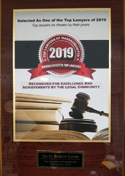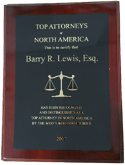1-800-348-6723
(Outside of Eastern and Central Massachusetts: 1-508-879-3262)

Case Law
REBECCA L. AMES vs. SAMUEL D. PERRY
406 Mass. 236
October 4, 1989 - December 12, 1989
Norfolk County
Present: LIACOS, C.J., WILKINS, NOLAN, LYNCH, & GREANEY, JJ.
In a modification proceeding after a judgment of divorce, the judge properly applied the standard of Knox v. Remick, 371 Mass. 433 (1976), and correctly determined, on consideration of all the circumstances of the parties, that the plaintiff (mother) had not demonstrated that the level of child support was inadequate to warrant a modification of the separation agreement so as to increase child support. [241-243]
COMPLAINT for divorce filed in the Norfolk Division of the Probate and Family Court Department on April 2, 1982.
A complaint for modification, filed on November 17, 1987, was heard by John V. Harvey, J.
The Supreme Judicial Court granted a request for direct appellate review.
Weld Henshaw for the plaintiff.
Roberta F. Benjamin for the defendant.
GREANEY, J. On May 21, 1982, the marriage of the parties was terminated by a judgment of divorce. In connection with the divorce, they executed a separation agreement (dated March 5, 1982) which survived the judgment as an independent and binding contract. The agreement contained provisions relative to the custody and support of the parties' daughter, Elizabeth (nicknamed "Lisa"), born April 4, 1973.
On November 17, 1987, the plaintiff brought a complaint for modification against the defendant in the Probate and Family Court seeking more child support than was provided for in the separation agreement. The gravamen of the plaintiff's complaint was that she had remarried and had a second
Page 237
child, that she was at home and not working, and that the defendant had improved his financial circumstances so that he should provide more by way of child support.
A judge in the Probate and Family Court held an evidentiary hearing on the plaintiff's complaint and made findings of fact and conclusions of law. Judgment entered dismissing the complaint for modification. The plaintiff has appealed. [Note 1] We granted the plaintiff's application for direct appellate review. We affirm.
The following facts are drawn from the judge's findings and the record. In 1982, at the time of the execution of the separation agreement, the plaintiff had received a master's degree in business administration and was earning in the "mid to high" $20,000 range with a consulting firm. She was repaying an education loan and had no assets. At that time, the defendant worked at a brokerage firm and earned between $30,000 and $40,000. His assets consisted primarily of family-owned or controlled real estate and business interests which had preexisted the marriage. The defendant's family was considered "moderately well-to-do," and it was known to the plaintiff that he had expectancy interests.
Lisa resided primarily with the defendant during the initial period of separation. However, under the custody provisions of the separation agreement, Lisa's time with each parent was to be shared equally, "insofar as that [was] pragmatically feasible and in the best interests of the Child." The pertinent text of the custody provision, which was agreed to by the parties after they had received the benefit of legal representation, is set forth below. [Note 2]
Page 238
The agreement expressly did not provide for child support payments from one parent to the other, stating instead that "[e]ach party agrees to contribute to the care, support, and maintenance of the minor Child when she is residing with that party." However, the defendant was required to pay all Lisa's medical and dental expenses, to provide for her college education, and to establish a clothing fund of $50 per month for her use. Although it was disputed, the judge found that the defendant is in compliance with all his obligations under the agreement.
During the seven years that the separation agreement has been in effect, the parties have shared physical custody of Lisa, who has generally resided with each parent for alternating two-week periods. Occasionally, Lisa has spent more time with one parent than with the other; for example, during the plaintiff's pregnancy with her second child, Lisa resided primarily with the defendant. In February, 1988, Lisa chose to reside principally with the plaintiff.
About five years ago, the plaintiff married Oliver Ames. Ames (who is divorced and has annual alimony and support obligations of about $36,000 to his first wife and three children) had a gross income in 1987 of $178,020. The plaintiff left her job about three years ago when she and Ames had a child. She presently is supported by Ames and has no plans to return to work. Her assets approximate $170,000, and consist primarily of her interest in the present marital home.
The defendant remarried in January, 1988, and has a child by his second marriage. His wife is not employed and had no assets at the time of trial. The defendant's present income is approximately $133,000. His assets also have substantially increased through an inheritance, participation in a profit-sharing plan, and appreciation of real estate interests.
Over the six-year period preceding trial, the defendant has voluntarily assumed payment of the cost of Lisa's private school tuition (approximately $12,000 a year). He also has established various investment and savings accounts for Lisa which have a value in excess of $100,000. He pays the taxes generated on the income from these accounts, which is reinvested.
Page 239
About $78,000 in additional funds have been allocated to Lisa from the defendant's mother. These funds are held by the plaintiff under the Uniform Gifts to Minors Act, and the investments are managed by her. The plaintiff indicated that she has spent $4,600 of the funds to pay expenses for Lisa and has paid an additional $12,000 from the account to pay part of her lawyer's fee in this litigation.
The judge concluded in substance that the plaintiff had failed to show "something more than a `material change'" of circumstances, and, as a result, was not entitled to modification.
The plaintiff focuses on the language in the judge's memorandum indicating that she had not shown "something more than a `material change'" of circumstances. The plaintiff argues that this standard (which the judge quoted from Stansel v. Stansel, 385 Mass. 510 , 515 [1982], and DeCristofaro v. DeCristofaro, 24 Mass. App. Ct. 231 , 236 n.7 [1987]), amounts to a misapplication of the standard set forth in the governing case of Knox v. Remick, 371 Mass. 433 (1976). She argues that the "something more" test should be applied only to complaints seeking to modify interspousal support provisions in independent separation agreements and, consequently, that the test should have no application whatsoever to modification complaints concerning child support issues. The latter, in the plaintiff's view, should be governed solely by the standard set forth in G. L. c. 208, Section 28, and case law applying that statute. [Note 3]
In Knox v. Remick, supra at 436-437, we first addressed the issue of the modification of interspousal support provisions in separation agreements that survive divorce judgments. We stated that a separation agreement fixing the amount of interspousal support, which was free from fraud
Page 240
and coercion and fair and reasonable at the time the divorce judgment was entered, "should be specifically enforced, absent countervailing equities." We than adduced examples of equities that might serve to counteract specific enforcement, Knox v. Remick, supra at 437, including, but not limited to, circumstances where one spouse is or will become a public charge or where the plaintiff has not complied with some other provision in the agreement. Id.
We went on in Knox v. Remick to discuss the issue of the modification of child support provisions in a separation agreement that survives the divorce judgment. We stated that an agreement to fix child support obligations "stands on a different footing" from an agreement to fix interspousal support. Knox v. Remick, supra at 437. We also provided an example of when specific enforcement might be denied to the child support provisions of an agreement. That example involved circumstances where a support order would be entered or modified in the absence of such an agreement and where the level of available support for the child has become inadequate because one former spouse is incapable of meeting his or her financial obligations. Id. at 437-438. The conclusion of our discussion in Knox v. Remick, supra at 437, made clear, however, that we had in mind specific enforcement of separation agreements, including the provisions for child support, "as far as possible." The Knox analysis of the modification of child support provisions was later condensed into a second "`something more' than a material change in circumstances" test by the Appeals Court opinion in DeCristofaro v. DeCristofaro, supra at 236 n.7.
The inquiry of the Knox court in either instance -- that is, with express reference to the modification of interspousal provisions or with express reference to the modification of child support provisions -- is consistent. In either instance, a separation agreement, which survives a divorce judgment and is valid at the time of the entry of that judgment (that is free from fraud and coercion and fair and reasonable) should be specifically enforced. A policy of enforcement supports finality and predictability, allows the parties to engage in future
Page 241
planning, and avoids recurrent litigation in the highly charged emotional area of divorce law. See Knox v. Remick, supra at 438; DeCristofaro v. DeCristofaro, supra at 237. However, in either instance, changed circumstances after the divorce can give rise to countervailing equities which would warrant refusal of specific enforcement of the agreement. In both instances, the test for a proposed modification is one that goes beyond G. L. c. 208, Section 28, by requiring something more than a material change of circumstances, namely the existence of special equitable considerations which make relief appropriate. It is not incorrect to abbreviate this standard into the shorthand phrase of "something more than a material change of circumstances."
Further, Knox v. Remick implicitly recognized that every inquiry on a proposed modification of child support provisions must necessarily include as one weighty "equity," the fact that the subject of the provisions, the child, was not a party to the agreement. This fact alone places the inquiry on a different basis from one where the parties to the agreement, responsible adults represented by counsel, were themselves the subject of their own deliberations. "While divorcing parents may in some cases bind themselves in contract on matters involving their children . . . they cannot thus withdraw the interests of those children, who are not parties to that contract, from the continuing jurisdiction of the [Probate] court" (citations omitted). White v. White, 141 Vt. 499, 503 (1982). If then circumstances arise after the divorce which work to the disadvantage of the child, by materially reducing the support available for the child (or otherwise harming the child), the Probate Court judge necessarily will possess discretion to correct the disadvantage. Much will be left to the good sense of the Probate Court judge in analyzing the specific case.
The plaintiff emphasizes that she is no longer employed, that she is at home caring for a young child, that she relies on Ames for support, and that the defendant's earned income and the value of his invested assets have increased considerably. As Lisa is now living in the Ames household, the plaintiff
Page 242
is seeking an order which requires the defendant to pay to her the money the defendant had expended on Lisa, or for her benefit, when custody was shared equally. In this way, the plaintiff seeks to be reimbursed for what she calculates is Lisa's pro rata share of the household and other expenses incurred annually by the extended Ames family.
The circumstances of remarriage, the start of new families, and reasonable increases in income and assets were probabilities contemplated by the plaintiff and the defendant when they divorced and signed the agreement, as was the possibility that Lisa, when she grew older and more independent, might make a choice to spend a greater amount of time with one parent than the other. This much at least can be drawn from the provisions of the agreement concerning remarriage, and the provision which sought to make an equal custody arrangement to the extent that that was "pragmatically feasible." As the judge observed, "[t]he parties addressed the fact that the child's residential schedule may change, but they did not change the support arrangement." We note also that many of the household expenses which the plaintiff seeks to attribute to Lisa are paid for by her present husband. The plaintiff thus derives economic benefits from her new marriage which help to maintain Lisa.
We need not consider whether, on the facts found by the judge, the plaintiff has satisfied the requirements of G. L. c. 208, Section 28, because, after consideration of the separation agreement, the defendant's monthly payments for Lisa, the plaintiff's past access to and use of the income paid on the custodian account for Lisa's benefit, the defendant's voluntary payment of Lisa's sizeable school tuition, which is expected to continue and will be followed by the payment of college expenses, compare Kirkwood v. Kirkwood, 27 Mass. App. Ct. 1156 , 1157 (1989), the plaintiff's present economic situation with Ames, and no indication that the standard of living to which Lisa has become accustomed has been appreciably diminished, the judge was warranted in concluding (in somewhat different words) that the plaintiff had not shown that "the level of available support for the child is inadequate."
Page 243
Knox v. Remick, supra at 438. See DeCristofaro v. DeCristofaro, supra at 239; Randall v. Randall, 17 Mass. App. Ct. 24 , 25, 32 (1983).
Judgment affirmed.
FOOTNOTES
[Note 1] A separate judgment entered dismissing the defendant's counterclaim. He has not appealed.
[Note 2] "The Husband and the Wife shall have joint legal custody of the minor Child, who shall reside with each parent for equal portions of the year (insofar as that is pragmatically feasible and in the best interests of the Child). The schedule (Living Schedule) shall be mutually agreed upon by the Husband and the Wife, and both agree that the Child's welfare shall be the paramount consideration in determining the Child's Living Schedule . . . . The Living Schedule of the Child shall be reviewed by the Husband and the Wife at reasonable periodic intervals."
[Note 3] General Laws c. 208, Section 28 (1988 ed.), provides that "[u]pon a complaint after a divorce . . . the court may [modify its earlier judgment] as to the care, custody and maintenance of the minor children of the parties provided that the court finds that a material and substantial change in the circumstances of the parties has occurred and the judgment of modification is necessary in the best interests of the children."
The Divorce Law Specialists - Office Locations
Areas of Service include but are not limited to the cities and towns listed below.
Click on a town for easy-to-follow directions.
Beverly, Boston, Braintree, Burlington, Cambridge, Framingham, Hyannis, Mansfield, North Andover, Westboro
1-800-348-6723 or 1-508-879-3262
Home Page • Our Law Offices • About You • Family Law • Resources • FAQs • Other Services • Contact Us
MAJOR CREDIT CARDS ACCEPTED
Copyright © 2002-2025 The Law Offices of Attorney Lewis • All Rights Reserved
1-800-348-6723 • BRL1963@gmail.com







